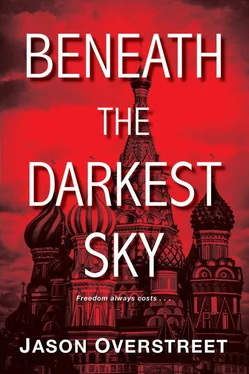Unlike my rather tame, scraggly beard, theirs were messy-long and caked with sawdust. They were young and muscle bound, as they were getting plenty of lifting exercise and hadn’t been deprived of food or water. Yet! Still, for the time being, one of the advantages of being stuck out here in the woods was getting to eat three hot meals a day.
I was beyond worried about the well-being of James back at the transit camp, or wherever else he might be, but chose to believe Abram was looking after him as he’d promised. Still, I wondered whether or not the old man had finally succumbed to malnutrition. If he had, perhaps Boris or Yury was watching over my boy now.
I tried not to think about what forms of brutality Loretta and Ginger might be suffering somewhere on this grand continent. Imagining their condition was too much to handle. I knew that no matter their circumstances, my wife and daughter would remain strong. Believing all of this was the only thing keeping me from falling further and further into Stalin’s perfectly assembled abyss.
As I stood next to a tall pine tree, holding my end of a long, two-man chainsaw, my partner and I began to cut through the thick trunk—woodchips spraying our brown sleeveless coveralls and white undershirts, sap spitting at our goggles. I was holding the end with the levers, my partner the handle portion. As the rotating chain continued ripping through the wood, he and I braced for the big fall.
“DEREVO PADAYET!” we yelled, as the tree began to tip and fall downward.
Both of us took a big step back and listened to the big pine crash into the shrubby hillside. Looking past its top, I noticed two shiny black automobiles approaching on the dirt road at the bottom of the slope. They parked near the guard’s barracks and six men in pristine uniforms got out.
“PUT DOWN YOUR CHAINSAWS!” yelled the guard who’d been tasked to watch over the six of us in this immediate area. “Time for lunch. When you are finished, you are to convene at the peeling yard. One of our commanders wants to speak to all of you zeks .”
The guard led us down the slope and past a line of big trucks loaded with fresh-cut logs. It hadn’t taken me long to realize that a major part of Stalin’s prison system involved forestry. I’d heard from other mates, however, that up north in Kolyma, zeks were not tasked to do logging. They were sent out to mine for gold. It sounded as if Stalin had established an elaborate enterprise, all of it seemingly designed to line his own pockets while zeks across the land did his slave labor, hardly part of Karl Marx’s original plan.
We finished eating our fish and beets at the food barracks and convened on the peeling yard, the perimeter lined with gun-carrying NKVD men. There wasn’t a second of the day when an armed unit of guards wasn’t watching our every move. And thankfully so, as I was certain there were savage murderers among us.
The peeling yard was a large plot of land where freshly cut pines were dumped. It was here where the nubs were sawed off, the bark peeled away, and the trunks turned into usable logs. There was no visible dirt or vegetation on the yard, as it was completely covered with sawdust, aromatic pine needles, and bark peels.
The most grueling part of being at Camp Z was having to pull trees down from the hillside to the road. Before pulling them, however, the treetops and most of the thick branches were sawed off. Then a chain was wrapped around the trunk, a thick rope tied to it. From there the trees had to be dragged to the road and loaded onto a low, flatbed trailer using a winch. The trailer was hauled away by a truck to the peeling yard. Pulling trees down the slope was excruciating labor, a team of men clutching a resin-covered rope and using every bit of strength just to move it a measly foot through the thick shrubs.
Most of the labor on this camp was done by way of sheer man power. There was only one bulldozer and a single skidder at the camp, both located at the peeling yard. The first was used to clear and haul excess, the second to load peeled and ready logs onto the transport trucks. Luckily, because I could operate heavy machinery, I’d had more than my fair share of opportunities to man the skidder.
If a zek were lucky, he’d get maintenance detail. This involved repairing, refueling, oiling, and cleaning the chainsaws at the tool barracks. It also meant removing resin from the handheld bark peelers with gasoline before sharpening them. Another routine job was that of a finisher. This person’s job was to receive the trunks at the peeling yard, saw off the remaining branches, and then peel off the bark.
In the end, regardless of what job one had, the days passed quickly. None of us was immune to getting an inordinate amount of splinters stuck in our fingers and arms, or blisters on our glove-covered palms. I’d also swallowed plenty of sawdust.
* * *
As we finished filing into the peeling yard, I noticed a makeshift, shallow, wooden stage that had been assembled. And on it, sitting side-by-side, were the six men I’d seen exit the two black vehicles earlier. Joseph Stalin was not amongst them, but each had the same air as the communist dictator. Their uniforms were adorned with medals, and they sat very erect, half smiling, as if they were looking out at us with a certitude regarding our ultimate fates.
The guards had positioned the few hundred of us zeks directly in front of the stage in rows of twenty-five. We hadn’t a clue what this meeting involved, and the looks of curiosity on the tired, black-oil faces around me begged for clarity.
“REMAIN STANDING!” yelled an NKVD officer from the stage. “You are some very lucky zeks today! Sitting on this stage are six of the top men in charge of our Great Stalin’s Far East Logging Company. This is one of many logging camps, but you are supposedly the most robust zeks in this part of the country. These bosses have come to judge who among you is the best example of strength and determination. Who among you is the greatest fighter? Perhaps one of you is worthy of having your sentence reduced by two years. Or, for you monsters, your life sentence cut to twenty years. Is any one of you out there such a man?”
“DA!” yelled all of the zeks, many of them foaming at the mouth at this surprising news. The screaming and hand-raising continued for at least a minute, as the men were desperate to hear their names called.
“QUIET DOWN!” the officer finally yelled, and we immediately did so. “Calm yourselves, zeks ! You all don’t know this, but we have been monitoring some of you for a long time, even from the time you were initially arrested. You were all selected to do logging because of your size and strength. But once you arrived here, we began comprising a list of the men we believe are truly the most impressive.”
He took a sheet of paper from inside his jacket and prepared to read.
“When we call your name, please come to the stage. And let me be very clear! If selected, you will be expected to fight each match until one of you can no longer move, either because of death, or because you are unconscious. If you stop before that… you will be taken away and shot! Now! Listen for your name!”
All of the prisoners looked around at one another in anticipation. Not a single zek among us was afraid to fight if it meant a sentence reduction. I prayed they’d call my name.
“Anatoly Ivanov!” he read aloud. “Bogdan Smirnov! Vitaly Petrov! Viktor Fedorov! Prescott Sweet! Leonid Nikita! Baldric Falke! Ziegler Hoffman!”
I was standing in the back and began approaching the stage with both anxiousness and concern. All of these selected prisoners were at least six-foot-two like me, or taller, but they were thicker men, more muscular. The air of each suggested they were more comfortable with death. Perhaps many of them didn’t have a family back home. What we all likely had in common was that we had killed before, albeit most of them looked as if they’d used their bare hands. Their victims probably hadn’t been on the receiving ends of bullets as mine had back in my Bureau days.
Читать дальше











